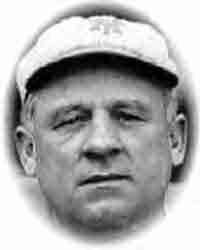


McGraw's personality was shaped in Truxton, New York, where he was born in 1873. His mother and four of his siblings died in a diphtheria epidemic. It was baseball that became young John's savior and first love. It was a way out for the young McGraw. His unsympathetic father was no help to his baseball career. His father, a Union soldier in the Civil War hated baseball, preferring the Irish game of "Shinny". Young John was beaten often, one time for breaking a church window, another for breaking a merchants window.
McGraw played for local teams before signing a $40-a-month contract with Olean, New York, of the NY/Penn League in 1890. After playing for several more minor league teams, he signed on with the American Association Orioles in 1891. That team would go down as one of the toughest teams of all time. McGraw soon emerged as the toughest and meanest of the lot, brawling with opponents and teammates alike.
McGraw began his managing career as the Orioles' player-manager, but when Baltimore was deleted from the NL in 1900 he was sold along with two other players to St. Louis for $15,000, where he batted .344 in only 99 games. In 1901 he became manager the new American League's entry in Baltimore. McGraw and and AL President Ban Johnson were constantly at odds over the little Irishman's Umpire Baiting tactics. McGraw and Johnson clashed almost from the start. In July 1902 McGraw was suspended indefinitely. In retaliation, McGraw conspired to deliver the Baltimore players to the NL. As part of the bargain he was named manager of the New York Giants. "
Known as "Little Napoleon" by the press and fans, Mr.
McGraw to his players and "Mugsy" to his enemies, he applied the tactics of the
old Orioles, the tactics of inside baseball, the hit-and-run, the stolen base, the scientific game
to achieve success. The Orioles were the roughest team in a rough age. McGraw would became the living embodiment of the rough spirit of the 1890's, carrying the 19th century's hard-bitten, take-no-prisoners ethics into the 20th century.
Honus Wagner, once told a story concerning an occasion when he hit a triple against the Orioles. It would have been a home run, he said, "except that the first baseman bumped him, the second baseman tripped him, the shortstop gave him a couple of shots when he went by and when he got to third, John McGraw pulled out a shotgun."
Years later, when Branch Rickey proposed that batting helmets be used in major league play, Casey Stengel remarked, "If we had them when I was playing, John McGraw would have insisted that we go up to the plate and get hit on the head."
McGraw was a paradox. A true puzzle. He could be gracious and generous when he wanted to be. He was known to give out gifts of money to his players for a job well done. He would be generous and sympathetic to ballplayers when they made mistakes! He raised the salaries of both Fred Merkle and Fred Snodgrass after there famous blunders. He prided himself in taking on reclamation projects and hard to handle ballplayers like "Turkey Mike" Donlin, Bugs Raymond and Hal Chase. He was unfailingly gracious with women and his best friend was the saintly Christy Mathewson.
But he had a Jekell and Hyde personality. He was a viscous umpire baiter. A man who resorted, in the Old Oriole Tradition, to winning at all cost. He was foul mouthed, and mean spirited to anyone or team who he considered to be a threat to the Giants. He made fun of people and their weaknesses, pushing their hot buttons. Barney Dreyfuss was a frequent target of McGraw, due to the Pirate owners thick German accent.
He tended to lay blame on other people when things went wrong. He blamed a World Series loss on his old friend and then Giants coach Wilbert Robinson, and the two of them did not speak again for nearly 20 years.
McGraw would take complete credit for every Giant win, directing every move on the diamond. Bill Terry, one of Baseball's truly nice guys, once said "McGraw will call every move and every pitch, till the count is three and two and the bases are loaded and then all of a sudden he leaves the pitcher to fend for himself ". "Memphis Bill" one day blasted McGraw after he blamed a Giants loss on one of his players who had made a miscue. "You've been blaming other people for the mistakes you've been making for 20 years".
But McGraw could be very loyal as well. At various times, he gave jobs to old Giant and Oriole players like Dan Brouthers, Amos Rusie and Mickey Welch. Babe Ruth once said "McGraw is nothing but a son of a bitch".
In the late 1920s and early 1930s he became increasingly erratic and harder to deal with. "The effect of being predeceased by several of his favorite ball players, Christy Mathewson, Iron Man McGinnity and Ross Youngs may have had an effect on his personality. McGraw did mellow slightly in his remaining years. After he gave up his managers post in 1932 he acquired a more easier going personality. He was also in declining help, which may have changed his outlook on life some what.
One thing is for certain, he remains, still to this very
day, one of the most interesting and puzzling characters, personality wise,
in Baseball History. John Joseph McGraw died as a result of uremia
complicated by cancer on February 25, 1934.